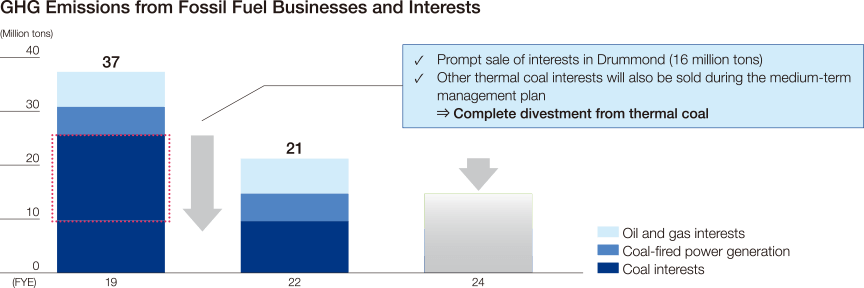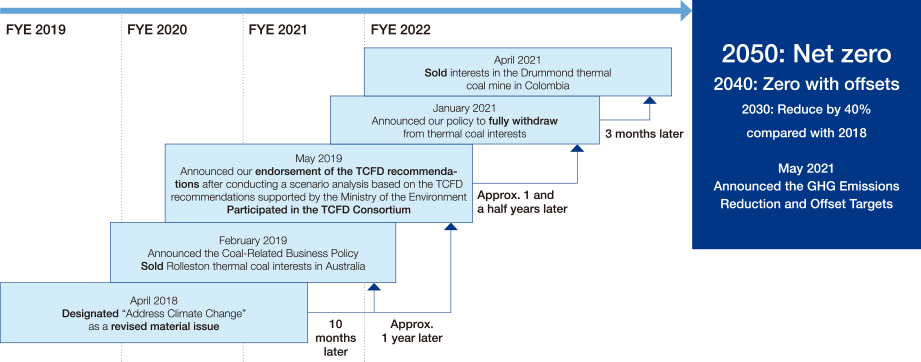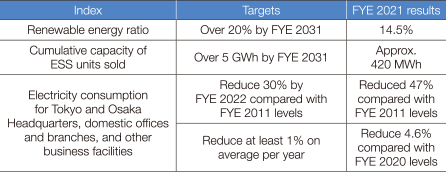Business Expansion in Accordance with a Decarbonized Society
ITOCHU completely divested its interest in the Drummond thermal coal mine in Colombia and disclosed the GHG emissions of all fossil fuel businesses and interests associated with the Company—a first in the industry. During the medium-term management plan, we will fully withdraw from thermal coal interests and build a distributed power supply platform centered on energy storage systems (ESS) to help realize the Government of Japan’s 2050 Carbon Neutral goal.
GHG Emissions Reduction and Offset Targets
• Achieving net zero GHG emissions by 2050 to comply with the Japanese government’s target. In addition, aiming to offset CO2 to zero*1 by 2040 by actively promoting businesses that contribute to the reduction of GHG emissions.
• Complying with the Japanese government’s interim target*2 by achieving a 40% reduction from 2018 levels by 2030.
*1 Offsetting CO2 to zero by subtracting “contribution to reduction” accompanying the expansion of renewable energy business, etc., from GHG
emissions.
*2 The Japanese government’s target of a 46% reduction from the 2013 level by 2030 is a 39% reduction based on the year 2018.

Efforts to Reduce GHG Emissions from Fossil Fuel Businesses and Interests
• GHG emissions from all Group fossil fuel businesses and interests* totaled 37 million tons.
• Through the sale of interests in the Drummond thermal coal mine, we were able to reduce GHG emissions to 21 million tons, taking the initiative in implementing concrete measures toward the shared societal goal of decarbonization.
•We will actively promote efforts to reduce environmental impact while fulfilling our responsibility to ensure a stable supply of resources and energy.
* Fossil fuel businesses and interests (consolidated subsidiaries, affiliates, and general investments): (1) Coal interests (thermal and coking coal), (2) Coal-fired power generation, (3) Oil and gas interests

State of Action on Climate Change
ITOCHU works to swiftly and forcefully reduce GHG emissions while ensuring improved profitability, especially in our strong non-resource sector. We will also continue expanding disclosures and assessing our action on climate change in line with the core elements of the recommendations from the Task Force on Climate-related Financial Disclosures (TCFD).

Risks and Opportunities

Governance
• Discussions held and decisions made by the Sustainability Committee regarding such important matters as formulating response policies for climate change-related risks and opportunities and establishing targets and initiatives for reducing GHG emissions(→ Structure for Promoting Sustainability)
Index and Targets
• GHG reduction targets
• Energy use and clean-tech targets

Risk Management
• Monitoring the risks and opportunities related to business caused by climate change countermeasures of various countries as well as extreme weather and changing average temperatures around the world
• Building an information management and monitoring system on a Group basis for specified climate change risks
(→ Countermeasures for Business Risks and Other Risks)![]()
Strategies
• Developing businesses by looking at the various risks and opportunities associated with climate change as an important perspective for business strategies
Scenario Analysis*
• Establishing two scenarios, an under 2°C and around 4°C increase in average temperatures by the end of this century, referencing the International Energy Agency (IEA) and Intergovernmental Panel on Climate Change (IPCC)
* Detailed disclosures of climate change data, including scenario analysis results, are available on Climate Change page.
